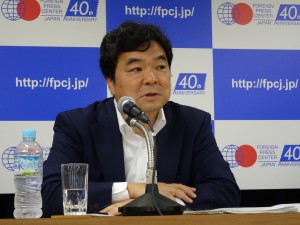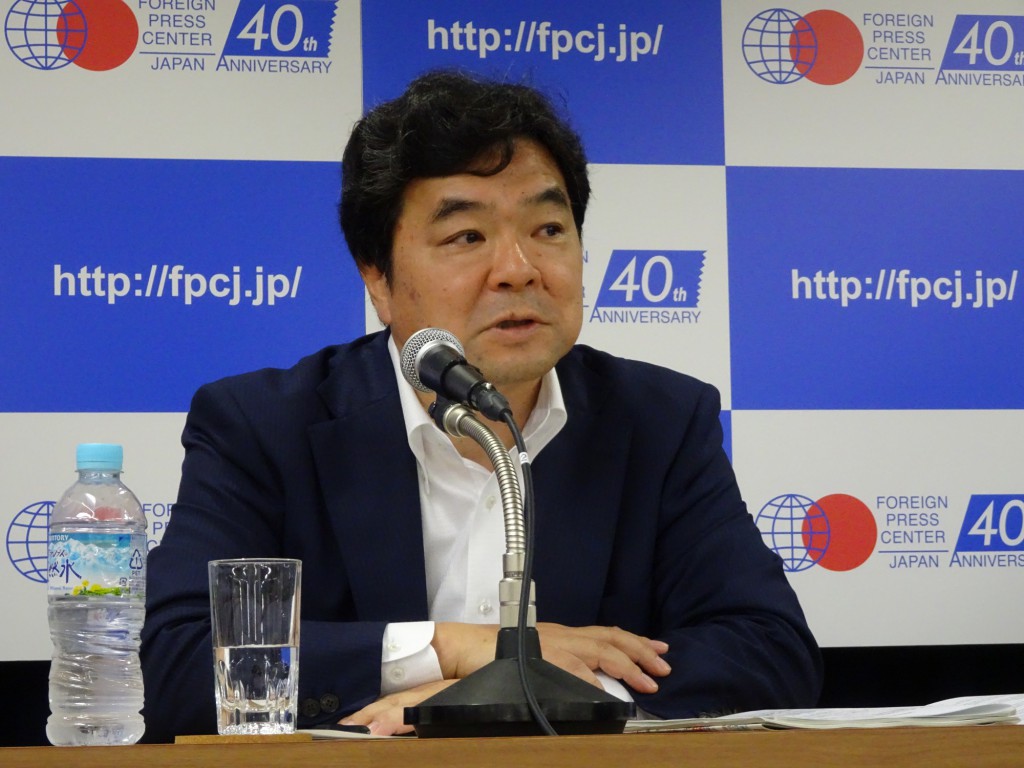OVERVIEW実施概要
- Date & Time
- Monday, June 13, 2016
Report: The Future of Economic Revitalization and Fiscal Soundness (JRI Chairman Susumu Takahashi)
 On June 13, the FPCJ invited Japan Research Institute, Ltd. Chairman Susumu Takahashi to discuss the future of economic revitalization and fiscal soundness as seen in the Basic Policies for Economic and Fiscal Management and Reform. The briefing had a total of 44 attendees, with 14 journalists from countries including Australia, China, Germany, Italy, Singapore, South Korea, the U.K., and the U.S., as well as 18 embassy officials.
On June 13, the FPCJ invited Japan Research Institute, Ltd. Chairman Susumu Takahashi to discuss the future of economic revitalization and fiscal soundness as seen in the Basic Policies for Economic and Fiscal Management and Reform. The briefing had a total of 44 attendees, with 14 journalists from countries including Australia, China, Germany, Italy, Singapore, South Korea, the U.K., and the U.S., as well as 18 embassy officials.
Mr. Takahashi started by explaining that although the Japanese economy is not worsening, the virtuous cycle that began under the Abe administration has definitely weakened. He expanded by saying that the global economic slowdown, particularly in China and other emerging economies, has had a major impact on the confidence of Japanese businesses and led to a more cautious approach to raising wages and investing in facilities. The issue facing the Japanese economy is that while it is necessary to develop new markets to once more increase demand, there are also problems with supply, and a slight increase in demand will bring the issue of a labor shortage due to population decline and an aging population to the forefront.
Considering the demographic outlook, Mr. Takahashi noted that of the “new three arrows” of Abenomics that have the goal of “dynamic engagement of all citizens,” the new initiatives were the second arrow of policies in response to a declining birthrate and aging population (support for young parents), and the third arrow of initiatives to deal with issues that arise when taking care of elderly or sick relatives. He explained the goal of these initiatives was to lessen the impact of the decrease in available labor to increase income and consumption, and bring about a virtuous cycle of growth and distribution that will also support the first arrow of a ¥600 trillion GDP. Also, if the “dynamic engagement of all citizens” is successful, then approximately nine million jobs will be created for new workers with a variety of skills, which will help solve the problem of the declining birthrate and aging population. To succeed with this goal, Mr. Takahashi stated the most important issue was a work reform based around equal pay for equal work, corrective action for long working hours, and increasing the employment rate for seniors. In order to accelerate the growth strategy, he said a major theme would be promoting the fourth industrial revolution including the Internet of Things, artificial intelligence, and robots, in order to increase the productivity of the Japanese economy with its expected labor shortage.
In regards to strengthening links with overseas markets through the TPP and other efforts, he listed two major policies: drastic simplifications of administrative procedures, and the introduction of the Japanese Green Card for Highly Skilled Foreign Professionals, which will be the fastest such system in the world.
Mr. Takahashi concluded by discussing the slump in consumer spending, one of the reasons for the consumption tax increase being delayed again. Although wages for people in their 30s are on an upward trend, concern over the future due to the increasing burden from social security means consumer confidence has remained low, and Mr. Takahashi pointed out the low spending of parents with young children. Although spending by low-income seniors is also weak, spending does not decrease for pension recipients that have a part-time job or other employment, which is one more reason to promote the employment of seniors. He emphasized the necessity of aggressive economic policies, stating that policies to stimulate consumer spending would definitely be necessary, with both wage increases and further support for raising children absolutely vital.
In the Q&A session, questions included what effect the negative interest rate was having on fiscal soundness, and what initiatives existed for improving the working environment and labor conditions, which could lead to increased wages.
[Note]
If you have released an article, photo, or video based on our press briefing report, please provide us with the (1) title of the piece, (2) author’s name, (3) date of publication/release, and (4) a copy of the piece or a link (if available), via email (cp[at]fpcjpn.or.jp).
*Please replace the “at” with “@” when you send the email.



